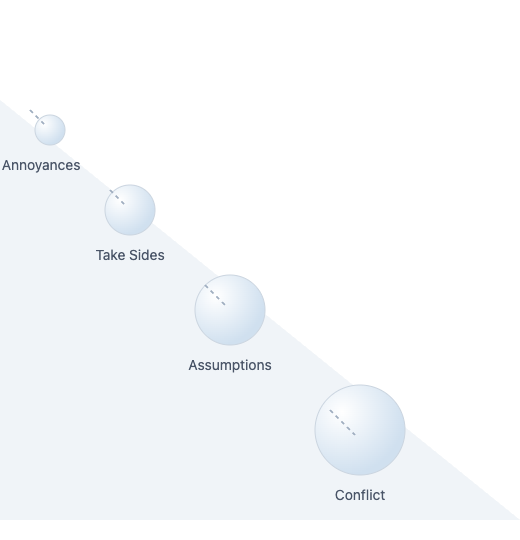Now that you know conflict can actually help you grow, let’s learn how to spot trouble before it gets big. Most conflicts—at work, at home, or with friends—don’t just explode out of nowhere. They usually start small, with little signs that something isn’t right. If you can catch these early, you can talk things out before they turn into bigger problems.
Think of yourself as someone who’s good at noticing when things feel “off.” Just like you might notice when a friend is quieter than usual or a coworker seems stressed, you can learn to pick up on the small clues that a conflict might be brewing. This isn’t about being nosy or worrying all the time. It’s about paying attention so you can help fix things early.
Conflicts often start with tiny changes in how people act or talk. Here are some everyday signs to watch for:
These small signs are like warning lights that something might be off. You don’t have to jump to conclusions, but paying attention to these clues can help you catch a problem early—before it turns into a bigger conflict. Noticing these patterns gives you a chance to check in and clear things up while it’s still easy to do.
If you ignore these early signs, small issues can pile up and turn into bigger conflicts. We can think of this like the snowball effect. Think of small annoyances or misunderstandings like a tiny snowball at the top of a hill. If you leave it alone, it starts rolling, picking up more snow (and more problems) as it goes. By the time it reaches the bottom, it’s huge and much harder to deal with. But if you stop it early, it stays small and easy to handle.

Here’s how it usually happens:
-
Little annoyances add up: Someone always being late, leaving dirty dishes, or not replying to group messages can start to bother people. At first, it’s just a minor irritation. But if no one says anything, these annoyances pile up. Over time, people might start to feel ignored, disrespected, or taken for granted. Eventually, one tiny thing (like a forgotten coffee cup) can trigger a much bigger argument, because it’s really about all the built-up frustration.
-
People take sides: When people don’t feel comfortable talking directly to the person involved, they might start venting to others instead. This can lead to “teams” or cliques forming, where people take sides or gossip about the problem. Suddenly, what started as a small issue between two people feels like a big group drama. This makes it much harder to solve, because now more people are involved and feelings can get hurt on all sides.
-
Assumptions take over: When people stop talking openly, they start guessing what others are thinking or feeling. For example, “She’s ignoring me on purpose,” or “He doesn’t care about my work.” These stories can quickly become “the truth” in someone’s mind, even if they aren’t accurate. Acting on these assumptions can make the conflict worse, because people react to what they believe is happening, not what’s actually going on.
The sooner you notice these patterns, the easier it is to stop them before they get out of hand. By catching these early, you can talk things out and prevent small problems from turning into big, messy conflicts.
If you spot an early warning sign, don’t wait for things to get worse. You don’t have to turn it into a big deal. Just check in with the person in a friendly way. Try saying: “Hey, I noticed you seemed a bit quiet this morning. Is everything okay?” or “I feel like we might not be on the same page. Want to talk it through?” The goal is to be curious, not accusing. You’re just opening the door for a conversation.
Here’s a simple example:
- Natalie: Hey Dan, you’ve been pretty quiet lately and your emails seem more formal. Is everything okay?
- Dan: I guess I’ve been frustrated about the project changes.
- Natalie: I didn’t realize. What’s bothering you about the changes?
- Dan: When the deadline moved, I felt like my input didn’t matter. I had to change my plans.
- Natalie: Thanks for telling me. Let’s figure out a better way to handle changes next time.
Natalie noticed something was off and asked about it in a kind way. That helped Dan share what was really bothering him, and they could fix the problem before it got bigger.
You can also help prevent conflict by making it normal to talk about how things are going. When people know it’s okay to bring up small issues, they’re less likely to let things build up. If you’re not sure what someone meant in a message, just ask! For example: “Just to be clear, we're meeting in 30 minutes versus an hour, right?” or_ “I want to make sure I understand. Does this plan work for you?”_ It’s much easier to clear up confusion right away than to fix a big misunderstanding later.
By paying attention to these early signs and reaching out with simple, friendly check-ins, you can stop small issues from turning into bigger conflicts. The more you practice, the more natural it will feel to notice these clues and talk things through before problems grow. Up next, you’ll get a chance to spot early warning signs in real-life scenarios and practice starting those helpful conversations yourself.
